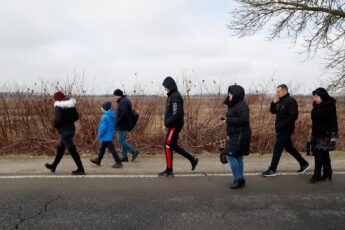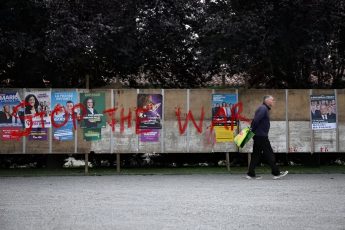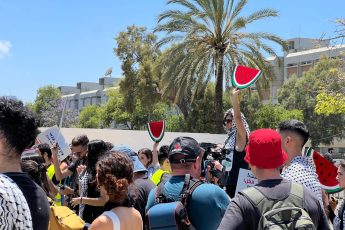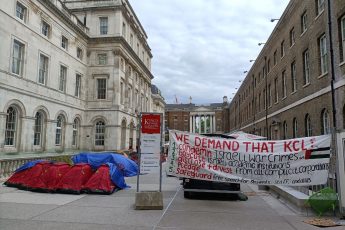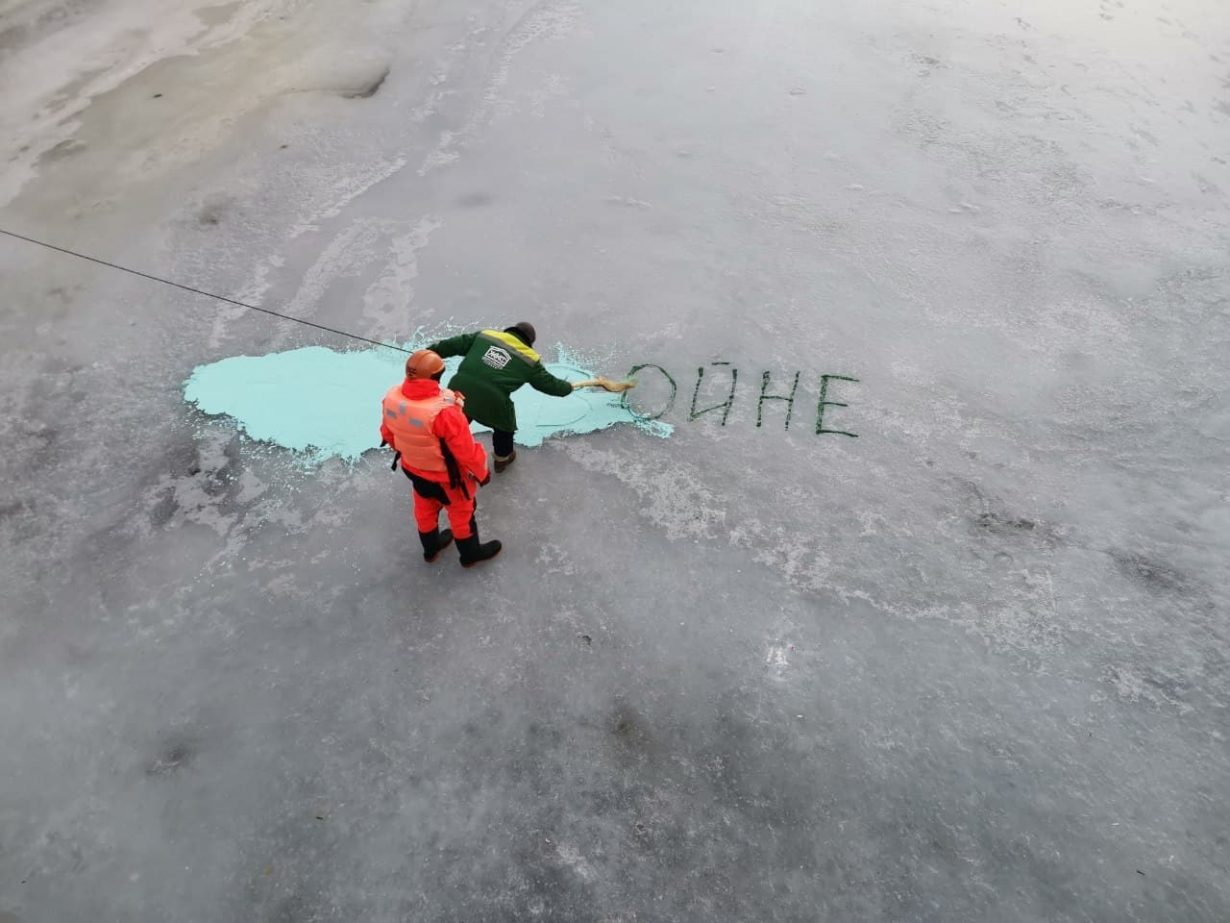
by PERMANENT ASSEMBLY AGAINST THE WAR
Nearly one year after the Russian invasion of Ukraine and the explosion of an open-ended war, the language and moves we see from all sides are that of escalation. As the war is shaking the pillars of a dissolving global order, some actors and states are directly involved in the war machine, others wait to see how things develop, ready to seize the right opportunity, and prepare their army to compete. Within this selfish political game, and regardless of the prospect of nuclear disasters, no institutional initiative is actively trying to stop the war in Ukraine. The war has become enmeshed within state politics and we don’t need to wait for further tragedies, in Ukraine or elsewhere, to acknowledge that we live in a third world war situation. After almost one year of war, the unconditional condemnation of Putin’s aggression cannot hide that we have been sucked by different actors into a bloody game. It is within this situation that we need to tirelessly concentrate our efforts in building a transnational politics of peace.
Within the politics of war global balances and positions within value chains are being reshaped. Where we see invasion and destruction, Russian politicians see the possibility to keep their power as suppliers, where we see death and deepening crisis in social reproduction, European and American politicians see opportunities for big business, where we see a war that must be stopped, other governments, including the Turkish, Iranian or Chinese ones see the chance to gain a higher economic and political role. Following a well-known path, even the fight against corruption in Ukraine hides a competition around the enormous investments for the reconstruction. This has less to do with the EU standards of democracy than with assuring financial investors that they, instead of one or other oligarch, will profit from ‘reconstruction’. The race to grab orders for repairing damaged Ukrainian infrastructure and the enthusiasm of the European Commission, global Consultancy Agencies and financial institutions for the prospects of reconstruction are shameless.
We don’t know in which way more tanks, missiles, ammunition and investments in military infrastructure from Europe and the US will change the course of the war. For months now we have been hearing calls that each escalation will bring the end of the war closer, but the reality is that everyone is preparing for a prolonged war. In spite of Putin’s murderous onslaught, he is not alone in dreaming of the benefits of war. Decisions in parliaments across Europe are reduced to a routine approval of due choices, directed by Governments’ inner circles. Politicians expressing even minimal disagreements on the delivery of weapons to Ukraine are accused of siding with the enemy. Any timid resistance is thus overwhelmed in the name of defending “liberty, property and profits”, as candidly stated by president Zelensky, while new Doctors Strangelove claim to be in full control and to know the limits of their actions. But we can’t buy their reassurances. Within this picture, nationalistic discourses aim at silencing dissenting voices and mute social conflicts behind the fog of war. The tank saga of the past weeks is a case in point: at the end of weeks of tensions, we now have deeper involvement in the war by more countries, and new demands for further weapons, including jet fighter planes.
While the war destroys lives in Ukraine, among the more direct beneficiaries of this war is the military industry, which is receiving an enormous boost. The number of industries and supply chains now interested in warfare is growing. The German arms manufacturer Rheinmetall is in the spotlight and its shareholders will profit from this escalation, and the same applies to military-industrial complexes in other countries on each side of this war. However, even if all this is clear to us, this does not translate into easy answers. The military industry is not isolated: it is a part of a complex supply chain which drives research, components and electronics, resources and logistics, services and labor. As a result of these entanglements, being simply anti-militarist is not a self-sustaining claim. We need to dig into the consequences of the war in Ukraine to root our opposition in the conditions and struggles of the subjects whose lives are transformed by it. If we want to be effective against the war in the longer term, if we want to contribute to a transnational politics of peace, we need to deal with the fact that the war affects the whole economic, financial and industrial sectors and it shakes social reproduction. To be effectively anti-militarist means today to be on the side of workers, migrants, women that pay the higher prices of the politics of war across and beyond national boundaries.
And what about us? We feel the urgent responsibility to organize against the war and the transformations it produces. We know this can happen only if we tackle the magnitude of the present challenges, starting from acknowledging differences among us with the aim of building a common ground. We need to go beyond the fragmentation and the campism imposed by the war ideology. We refuse the logic of nation states and we don’t accept that nationalistic discourses or geopolitical alignments kidnap our political imagination.
At the same time, we must face the fact that the part of the world where most of us live and struggle is directly involved in the war in Ukraine. Representatives of European institutions either directly or indirectly admit that “we are at war”, and European policies and political balances are reshaped accordingly. We see how positions once relatively distant among EU Member States, such as Poland and Czech Republic, Germany or France, now find some wary convergence, with the encouragement of the USA, as the war continues. In the present conjuncture of European politics, we want to address divisions between ‘East’ and ‘West’ and avoid ruptures between different experiences and forms of organizing, with the aim of learning from each other and building a common capacity to refuse the politics of war and struggle against the different forms of exploitation, racism and patriarchy we experience. Looking beyond Europe, we want to strengthen the existing bridges between the different shores of the Mediterranean as well as towards Central Asia and build new ones.
As a matter of fact, the war is boosting a rise in costs of living that increases poverty across the world, is whipping away the commitments to tackle the climate crisis; the promotion of civil and social rights is not in the agenda; any hypothesis of expansion of social budget for collective care after almost three years of pandemic is overwhelmed by the increase of military spending; workers are required to contribute to all this by putting aside their demands; patriarchal roles are strengthened; and the whole discourses on migration reframed within the boundaries of hybrid threats, legitimizing further militarization of borders. Behind discourses on supposed ‘European values’ lies a reality that fuels the hatred among people through the unequal treatment of refugees, the hypocrisy of granting temporary protection to Ukrainians while leaving them exposed to harsh exploitation, the refusal to welcome deserters and objectors, whether from Ukraine, Russia or Belarus.
Yet, while the war is reshaping the political landscape, labor disputes are on the rise. A wave of strikes sweeps through several countries and workers are resisting the attacks on their living standards and the push to work harder and longer. Mass strikes are happening in places like France and the UK; scattered strikes disturb the plans of multinational platforms and companies; climate activists gathered in Lützerath find new force and new demands; migrants keep challenging the border regime and institutional racism; women and feminist movements are organizing, building on the experience of the feminist strike; revolts are shaking the patriarchal regime of one of Putin’s main allies, Iran. In all these experiences, the strike is a tool which constantly crosses the boundaries of workplaces and social conditions. From within these struggles, we strengthen our commitment to develop a transnational politics of peace which aims at overturning the politics of war and paves the way for collective strategies for a different world. This means for us also to tackle the divisions and lack of communication among different movements, different conditions, and different locations, which are made deeper by the war.
For these reasons, we will be part of the Transnational Meeting organized in Frankfurt am Main from the 10th to the 12th of February by the Transnational Social Strike Platform and the Interventionist Left. There we aim at deepening transnational communication, building new relations and developing common strategies in the long term, as well as discussing next mobilizations, including the Climate Strike on the 3rd of March and the feminist strike of the 8th of March. These moments are essential in the definition of a transnational politics of peace. But we know more is needed. We need a transnational mobilization against the war in Ukraine and the politics of war. We need to organize in order to build a transnational politics of peace. This is something that we can and must plan together and a major goal of the Permanent Assembly Against the War: we want more, let’s begin to do it in Frankfurt.


